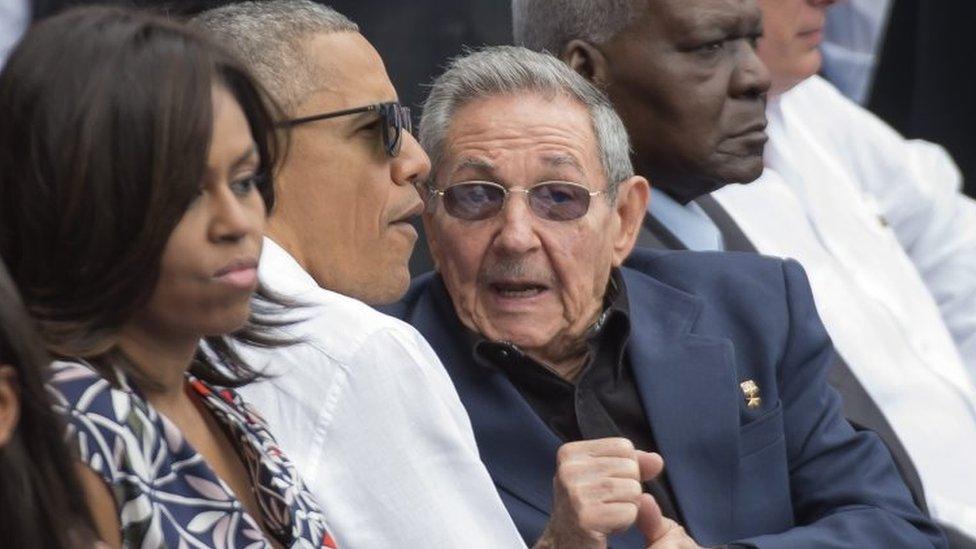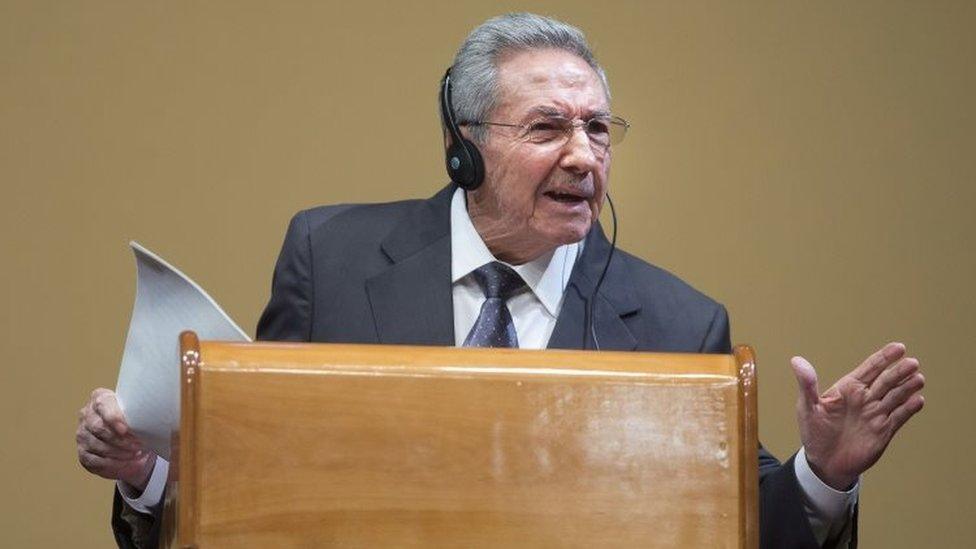Obama Cuba visit sets new tone
- Published

Barack Obama (centre) and Raul Castro (right) looked at ease as they talked before a baseball game in Havana
President Barack Obama's trip to Cuba this week was peppered with memorable moments.
Perhaps it was inevitable. Almost 90 years since the last US president visited the island, and certainly the first since Fidel Castro took power in 1959, it was always going to be historic.
There was high symbolism, such as the wreath-laying at the memorial for independence hero Jose Marti or the Star Spangled Banner playing in Revolution Square.
But for those of us who were here before the circus came to town, and will still be now it's gone, a few other things stuck in the mind.
I'm not sure if "family diplomacy" is an actual academic term, but if it were, the Obamas in Havana would be the dictionary definition.
Family life is central to Cubans, and I think most people here appreciated the fact that Michelle Obama and the girls joined the president on this visit. He even brought the mother-in-law!
This was no cold and calculated diplomatic mission to an old enemy.
He seemed to genuinely want his daughters to experience history and to see Cuba for themselves. He joked about how as teenagers they didn't like to join their parents on holiday any more, but that this was one trip they didn't want to miss.
'What political prisoners?'

President Castro was challenged on Cuba's human rights record during a rare news conference to the world's media
It may have helped his message to young people on the island too, of course.
The first family sitting next to Raul Castro at a baseball match was hardly the image of evil US imperialism that past generations of Cubans were taught to associate with the White House.
The trip by and large went smoothly, but it wasn't all careful choreography.
The biggest surprise was the fact that Raul Castro was prepared to subject himself to the world's media. He simply doesn't do that.
It was a first, as far as I could see. At the very least, the first time in years. It probably became the most uncomfortable moment of the visit too.
First question up, President Castro was challenged on Cuba's human rights record by a Cuban American journalist.
After fidgeting with the earphones and appearing to misunderstand whether the question was directed at him, he interrupted his guest in mid-flow.
"What political prisoners?" he retorted. "Give me a list of political prisoners and I'll release them immediately.
"Just give me a name. If we have those political prisoners they will be released before tonight ends," said Mr Castro.
We can safely assume they won't be, as Cuba doesn't consider them to be political prisoners in the first place.
President Obama later said the White House didn't provide such a list to the Cubans - but that engagement was the right way to tackle such differences.
Obama oratory
Nevertheless, to those of us who have to make do with short sound-bites as Mr Castro walks into a meeting or decipher what he says to the state media, it was an astonishing moment.
We might hope that he'll be more open with the international media in the wake of the trip.
But I'm not expecting a phone call from the presidential office, inviting me for a sit-down interview with Mr Castro anytime soon.
In a televised address, Mr Obama said he had come to ''extend the hand of friendship to the Cuban people'
While the issue of human rights and democracy created a little tension, it didn't stop it recurring as a theme throughout the trip.
For Cubans, many of whom couldn't have imagined a state visit by a serving US president, the most extraordinary moment of all was the televised speech to the nation.
Mr Obama is an impressive orator. Here he was at his most assured, finding the right tone between conciliatory and assertive for his audience.
"I have come here to bury the remnant of the Cold War in the Americas," he said.
But he wasn't about to go over Washington's mistakes in Latin America again. He pointed out that he was born a year after the Bay of Pigs debacle and wanted to move on from the past.
He spoke directly to Raul Castro and the gathered members of the Cuban Communist Party - but also millions watching at home or listening on their radios.
"The ideals that are the starting point for every revolution - America's revolution, Cuba's revolution, the liberation movements around the world - those ideals find their truest expression, I believe, in democracy."
It was a deft turn of phrase, in essence using Cuba's revolutionary principles against its own leaders. On their very turf, live to the nation.
Healing?
President Obama said he "knows the history, but refuses to be trapped by it" - perhaps an echo of Fidel Castro's famous "history will absolve me" speech.
He didn't avoid making his position clear, though, on the issues that divide them, saying if it was to be an honest and open relationship, then they should know what he thinks.
"I believe citizens should be free to speak their mind without fear, to organise and to criticise their government and to protest peacefully. That the rule of law should not include arbitrary detentions of those who exercise those rights."
Both Cubans and Cuban-Americans who watched these different events unfold told me they'd shed a tear at some moment during this trip, specifically during President Obama's speech.
It had that sense of healing the bitterness of the past about it. The bar for the new relationship has been set, and it's very high.
It will soon be down to Barack Obama's and Raul Castro's replacements to see if they can reach it.